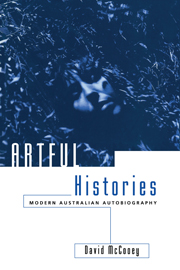Book contents
- Frontmatter
- Contents
- Acknowledgments
- Introduction
- 1 Autobiography and History
- 2 Beginnings: Histories and Families
- 3 Beginnings and Myth
- 4 Parents, Crisis and Education
- 5 The Hidden Past and Personal History
- 6 Autobiographies of Displacement
- 7 The Individual and Place
- 8 Fiction and Autobiography
- Conclusion
- Notes
- Select Bibliography
- Index
5 - The Hidden Past and Personal History
Published online by Cambridge University Press: 05 March 2012
- Frontmatter
- Contents
- Acknowledgments
- Introduction
- 1 Autobiography and History
- 2 Beginnings: Histories and Families
- 3 Beginnings and Myth
- 4 Parents, Crisis and Education
- 5 The Hidden Past and Personal History
- 6 Autobiographies of Displacement
- 7 The Individual and Place
- 8 Fiction and Autobiography
- Conclusion
- Notes
- Select Bibliography
- Index
Summary
Nature is Often Hidden; Sometimes Overcome; Seldome Extinguished.
As we have seen, to consider one's personal past is in some way to reflect upon a wider, social past. The extent to which these categories are dialectically related is observable in a consideration of three autobiographies. Graham Mclnnes's Finding a Father, Patsy Adam-Smith's Hear the Train Blow and Sally Morgan's My Place each seeks to evaluate the historical and social importance of parentage and the tension between conflicting versions of the past with regard to writing personal history. Just as we look at social history to cast light on the individual, so too do we consider individual history to cast light on society.
The anxiety regarding the past which characterizes modernity ironically occurs in a time when we are in the position to know more about the past than ever before. Despite the great effort which goes into preserving the past for future narrators, these days the past is not merely another country, but another world: what Thomas Mann describes in The Magic Mountain as an ‘exaggerated pastness’ since the Great War. The three autobiographers discussed below consider their pasts with some degree of formality, and it is no surprise to discover that Mclnnes wrote art history and Adam-Smith social history before and after writing autobiography.
- Type
- Chapter
- Information
- Artful HistoriesModern Australian Autobiography, pp. 91 - 108Publisher: Cambridge University PressPrint publication year: 1996



